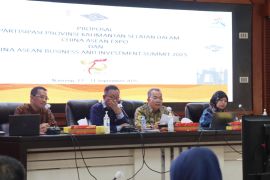The focus of the family planning program in rural areas by establishing family planning villages, better known as Kampung KB, aims to offer a broader understanding to the people of the initiative launched by the government to reduce the birth rate.
The promotion of the family planning program in rural areas is expected to further reduce the birth rate, so the growth of the Indonesian population can be brought under control.
In Tapin District, the local government has touted 11 rural areas as Kampung KB in 2017, according to Tapin District Head Arifin Arpan.
According to Arpan, touting the rural areas as Kampung KB was part of the central governments programs that should be followed up jointly.
"The central government program for family planning should be followed up from the village to the national level, so that the problem of population growth can be tackled," the Tapin district head noted.
The presence of Kampung KB in several districts in South Kalimantan is intended to realize healthy and prosperous families.
In addition to Tapin District, the Kotabaru district government in South Kalimantan is making all-out efforts to improve the quality of life of the community by intensifying the implementation of the family planning program.
In order to implement priority activities of population control programs to improve the quality of life of the community, the Kotabaru district government continues to increase the number of Kampung KB.
Indonesia has launched Kampung KB as part of its efforts to revitalize the national family planning program that will help improve the health of its citizens.
The family planning program in Indonesia has become a role model for several developing countries after it succeeded in reducing the total fertility rate and population growth.
In the past several years, the countrys family planning program did not witness any significant progress and had to be revitalized through the Kampung KB program.
Hence, Kotabaru District is among the several regions across the country to increase the number of Kampung KB as part of the implementation of the Population, Family Planning, and Family Development program.
Kotabaru District Head Sayed Jafar has remarked that the family planning program, through the Kampung KB, is being implemented at the lowest level by involving all partners of related agencies in accordance with the needs and conditions of the region.
Jafar expressed hope that the presence of Kampung KB would motivate all elements of society to jointly create a more prosperous nation in future.
In the meantime, Kotabaru Department of Population Control, Family Planning, Women Empowerment, and Child Protection Chief Rurien remarked that Kampung KB is believed to be able to drive community participation in realizing village development towards achieving prosperity.
According to Rurien, family planning villages are managed and organized to empower and offer convenience to the community to avail complete benefits of the family planning program.
Hence, the local government has encouraged the Kampung KB to serve as the engine of growth in villages, with the aim of overcoming poverty and unemployment.
The presence of Kampung KB in some districts in Indonesia has raised awareness among pregnant women and those expecting to give birth to undergo regular health check-ups at the integrated health service posts, or Posyandu.
Kampung KB is a miniscule part of guiding demographic changes in a progressive manner. Family planning and family development programs must involve all elements in the National Demography and Family Planning Agency.
Through the Kampung KB, the government is keen to enhance public awareness on the importance of family planning as its benefits extend beyond just a womans health to her entire well-being and prosperity.
When couples choose to have smaller families, it also ensures that they will have adequate means to provide for them and build a more prosperous future not only for themselves but also for the entire nation.
Accordingly, all villages need to have Kampung KB to support the success of the family planning program. This will result in a better quality of life and will also help underprivileged families.
"Kampung KB is designed to be a model of integrated development pertaining to the population and will be implemented at the micro level," National Population and Family Planning Board Head Surya Chandra Surapaty had stated some time ago.
The family planning program is expected to further improve the welfare of the community and help the people to break free from the shackles of poverty.
According to Surapaty, family planning will also result in people paying greater attention to aspects, such as the right age for marriage, ideal gap between child births, the number of children, and expenses required for meeting the educational and health needs of the entire family.
Moreover, some years down the lane, Indonesia will be able to reap the demographic bonus, a condition wherein it will have more people belonging to the productive age bracket than citizens from the unproductive group, such as the elderly and children.
Of course, even a demographic bonus can turn into a disaster unless it is properly controlled through good planning.
The transmigration program, long out of the spotlight, needs to be revived.
Transmigration is important for Indonesia, as the country has a high rate of population growth.
Transmigration is proven to have made a significant contribution to the economic growth in various areas that were not too well populated.(*)
Reporter: Otniel Tamindael
Editor: Heru Purwanto
Copyright © ANTARA 2017











